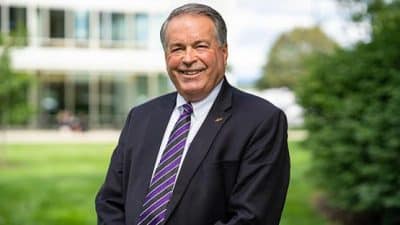
And of course, couldn’t talk with a former POTUS without talking about the presidential race.
Interesting take from Monroe, who hails from just over the hill in Albemarle County.
“We’re looking at an extraordinary presidential season in which a former Secretary of State is unable to take the genius of that office into the executive, and he’s in opposition to a man who would take everything and turn it on his head, and tends to act before he thinks. I’m talking about John Quincy Adams and Andrew Jackson, you see,” said Monroe, brought to life by interpreter Dennis Bigelow, who has been portraying the statesman for the past 16 years.
Bigelow will be appearing at the Wayne Theatre as Monroe on Tuesday, Sept. 27, as part of the Wayne’s Signature Speaker Series.
Monroe was the final of the three Central Virginians who served as president back-to-back-to-back, beginning in 1801 with Thomas Jefferson and running all the way to the end of Monroe’s second term in 1825.
Monroe was the last president who was a Founding Father, who fought in the Revolutionary War, served in the Continental Congress and later was a U.S. senator and governor of Virginia.
The history books have been kinder to Jefferson, who authored the Declaration of Independence and founded the University of Virginia, and Madison, the Father of the Constitution.
There’s a good reason for that, said Bigelow: “Monroe was one of those people who was willing to give credit to the other person if it advanced the work that had to be done.”
“It’s very easy to forget James Monroe, but I’ve attempted to get into his boots. Actors like to get into the boots that they think they can fill. I hope he’s not turning over in his grave, but I’m beginning to fill those boots after 16 years, and I have a great affection for this man,” said Bigelow, noting Monroe’s key role in American history.
Monroe can’t be separated from the Declaration of Independence: “He took a ball at the Battle of Trenton in achieving the results of that Declaration of Independence,” Bigelow pointed out.
“You cannot separate him from the Constitution itself. He was the one who put pressure on James Madison to make sure that we would have that Bill of Rights that we say is so important to us today and is so essential to our way of thinking and our government,” Bigelow said. “And you cannot separate him from the Louisiana Purchase, the largest acquisition of territory in modern history without resort to war. Monroe was very much a part of that.”
Bigelow is 73, the age at which Monroe passed away, on July 4, 1831, but Bigelow is far from being done in bringing Monroe to life.
“As long as I’m among the quick, I hope to continue to play this man, because there’s something new to learn about him all the time,” Bigelow said. “Our history is not dead stuff, it’s living stuff, and it’s there to be unearthed by people who want to know something about the people who put the fabric of this country together, and wrestled with all of the complexities that we wrestle with today. Which is why somebody like Monroe can be useful as we think about our own history, even today.”
Monroe was succeeded as president by John Quincy Adams, who served one term before being defeated in 1828 by the fiery Andrew Jackson in an election cycle that has some similarities to what we’re seeing in 2016.
That race, as Bigelow had noted above, pitted a former Secretary of State and a populist in a race that got down and very dirty.
Back in character as Monroe, there was an attempt made at offering a voice of reason to both election cycles.
“They’ve said terrible things about each other through their surrogates. And we have to live with each other, of course, once the election is over. I try to remind these good gentlemen of that, but they’re in the ferocity of the election itself, and it’s a tempestuous time for this country. But we’ve come through it before.”
The 1828 election wasn’t as bad as it would get. Bigelow-as-Monroe pointed back to the election of 1800, “when Mr. Jefferson turned to me, and he said, I think the Federalists may steal the election from us, and I as governor of Virginia was prepared to muster the militia along with the governor of Pennsylvania and go into Washington, the city, itself and make sure the Federalists relinquished what they no longer had.”
“So, you see we’ve had some difficult times before.”
Story by Chris Graham










